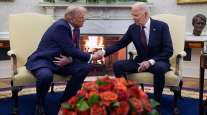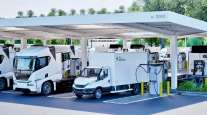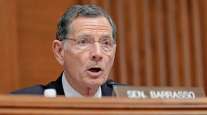Senior Reporter
ARTBA Chairman Bob Alger Calls on Congress to Restore Highway Trust Fund

[Stay on top of transportation news: Get TTNews in your inbox.]
Congress needs to restore a federal highway account headed toward insolvency to provide funding certainty across the infrastructure construction sector, the leader of a national transportation advocacy group told lawmakers July 16.
Addressing the transportation policy committee in the U.S. House, Bob Alger, chairman of the American Road and Transportation Builders Association, laid out an infrastructure funding road map that consisted of increasing the tax rates for gasoline and diesel fuel, approving a freight-based user fee for heavy trucks and establishing a one-time tax on vehicles batteries.
The tax would target alternative fuel vehicles. “Fully electric motor vehicles exact the same wear and tear on the nation’s roads as those powered by gas, without contributing one penny to the [Highway Trust Fund],” Alger said in prepared remarks.
“It is clear that we must invest more capital in our transportation systems,” he added, “and that goal cannot be achieved without a permanent revenue solution to ensure the [Highway Trust Fund] can support this needed investment growth.
“There has been a lot of talk about a federal infrastructure initiative since the 2016 presidential campaign. It is time to stop talking and start acting.”
With 15 months before the authorization of federal infrastructure programs expires, transportation policymakers have yet to anchor their legislative efforts on a specific long-term source of funding for highway projects around the country.
Earlier this year, Rep. Earl Blumenauer (D-Ore.), a member of the Ways and Means panel, unveiled legislation that would propose an increase to the fuel tax of 5 cents per gallon over five years indexed to inflation. His bill was referred to the committee for consideration. Companion legislation in the Senate has yet to be introduced.
Blumenauer is among the few policymakers endorsing a fuel tax increase this year.
The Ways and Means panel in the House and Finance Committee in the Senate, both with jurisdiction over the Highway Trust Fund, have not indicated when they intend to address the account’s looming shortfall. The account relies on dwindling revenue from the fuel tax. Analysts estimate its insolvency will occur in a couple of years.
ARTBA is among several infrastructure stakeholders promoting an increase to the federal fuel tax to boost the trust fund. The Transportation Construction Coalition, co-chaired by ARTBA and the Associated General Contractors of America, recently launched an online campaign to promote congressional action.
“Our national transportation infrastructure is severely underfunded, which is crippling our economy and endangering lives. The time for Congress to fix this is now — ask [name of tax-writing policymaker] to start work today to get our nation moving in the right direction again,” according to the coalition’s online message.

The U.S. Chamber of Commerce, also an advocate for a higher federal fuel tax, is part of the online campaign. The chamber prompts visitors to its website to endorse a letter to Congress. The message of which is as follows: “The United States needs new and sustainable revenue generators to modernize America’s transportation system or else the Highway Trust Fund will run out of money and regional projects will be affected. Ask President Trump and the new Congress to work together to pass long-term funding and financing solutions that will help safeguard a better tomorrow for America.”
The federal tax of 24.4 cents per gallon for diesel and 18.4 cents per gallon on gas was set in 1993.
Opponents of approving a higher fuel tax on Capitol Hill advocate for establishing a fee for the miles motorists travel, or devolving transportation funding responsibilities to state governments. Citing federal uncertainty on infrastructure funding, more than two-thirds of the states in recent years approved higher gas and diesel taxes.




